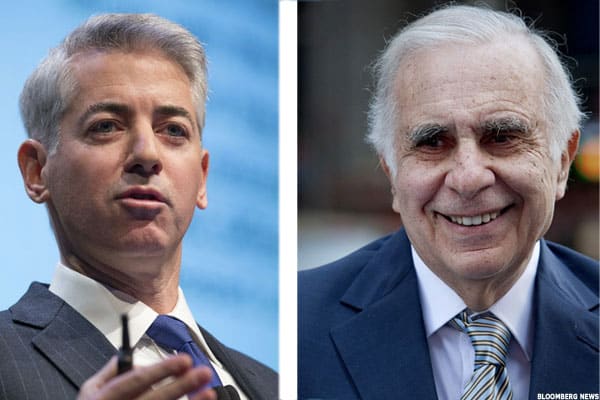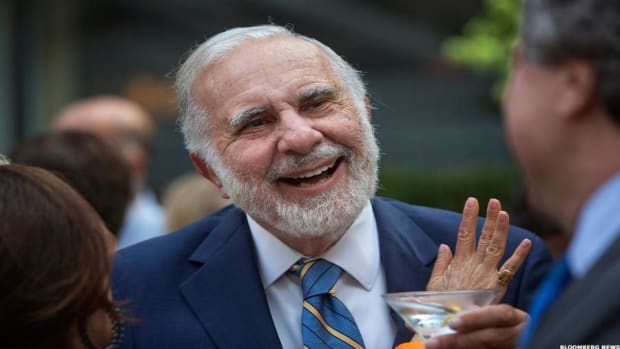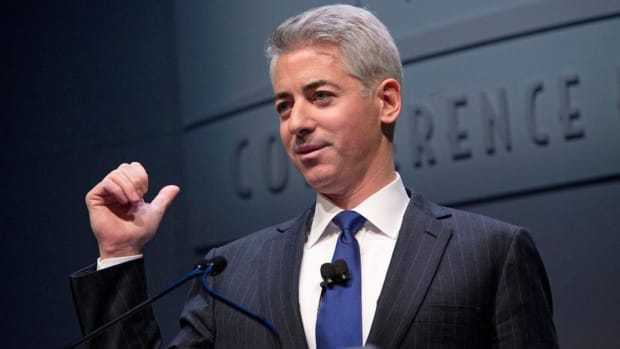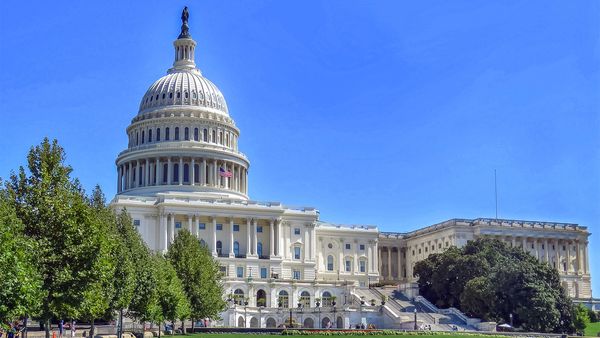
A few years ago they fought one of Wall Street's most intense battles, a confrontation that defied any film scenario on finance.
In 2013 the activist investors Carl Icahn and Bill Ackman found themselves at the opposite ends of the Herbalife nutrition group.
Ackman, through his Pershing Square hedge fund, accused the nutritional-supplements company of being a pyramid scheme, often known as a Ponzi scheme. He had therefore shorted the company, making a $1 billion bet that its stock would decline.
But he found Icahn, via his IEP hedge fund, on the opposite side of the bet, with a more than 17% stake in Herbalife and five seats on the board.
The dispute erupted on the air on CNBC's "Fast Money Halftime Report,” in what was then dubbed the "Battle of the Billionaires." They insulted and accused each other live for nearly half an hour.
It all started in 2013 with Ackman, in a phone interview, defending himself against attacks from Icahn. He agreed with the host to have Icahn call into the show.
'Liar': Icahn Said of Ackman, Who Hit Back
Once on the air, Icahn called Ackman a "liar," accusing him of having "one of the worst reputations on Wall Street.” Icahn later said to Ackman: "I wouldn’t invest with you if you were the last man on Earth.” Ackman countered: "Icahn unfortunately does not have a good reputation for being a handshake guy.”
Icahn lambasted Ackman, calling him the "quintessential example that on Wall Street, if you want a friend, get a dog.” Ackman blasted back at Icahn: "This is not a guy who keeps his word. This is a guy who takes advantage of little people.”
It was epic.
A few months later, at the CNBC/Institutional Investor “Delivering Alpha” conference in July 2014, the two billionaires publicly made peace by hugging.
Nine years later the two activist investors seem to have held a grudge. Ackman, 57, has just predicted a deluge will overtake his rival Icahn, 87. This prediction follows a campaign by New York investment firm Hindenburg Research against Icahn Enterprises LP, (IEP) Icahn's publicly traded company.
IEP has investments in seven primary segments: finance, energy, automotive, food packaging, real estate, home fashion and pharma.

In a report published early this month, Hindenburg accuses Icahn of using a Ponzi-like scheme at IEP, which is a limited partnership that operates like a holding company. The report said that IEP's stock was overvalued relative to its underlying holdings. In addition, it said that the higher dividends IEP paid were not sustainable.
"In brief, Icahn has been using money taken in from new investors to pay out dividends to old investors. Such ponzi-like economic structures are sustainable only to the extent that new money is willing to risk being the last one 'holding the bag'," Hindenburg said on May 2.
The short-seller didn't accuse the legendary corporate raider of wrongdoing.
"We have full confidence in the integrity of our presented financials and our reporting," David Willetts, chief executive of IEP, said during the first-quarter-earnings call on May 10.
The DoJ Is Investigating IEP
The same day the company said in a regulatory filing that the U.S. Attorney’s Office for the Southern District of New York had contacted Icahn Enterprises, seeking information about corporate governance, capitalization, securities offerings, dividends, valuation, marketing materials, due diligence and other disclosures.
"Mr. Anderson’s modus operandi is to launch disinformation campaigns to distort companies’ images, damage their reputations and bleed the hard-earned savings of individual investors,” Icahn Enterprises said in a statement on May 10, referring to Nathan Anderson, who runs Hindenburg.
"But, unlike many of its victims, we will not stand by idly. We intend to take all appropriate steps to protect our unitholders and fight back.”
These events have sent IEP’s stock down to its lowest levels since 2009. IEP’s stock fell 13% to $23.94 in the May 24 trading session. IEP shares have lost about half their value since Hindenburg published its report.
Ackman is convinced that the stock's decline will continue because the share price is supported only by the high dividend and not by the company's ability to generate profit. This creates a bubble, according to Ackman.
The high dividend is funded by IEP issuing more shares to investors; it is not supported by the company’s profit and outlook, he argues.

"The $IEP premium has been sustained by a large dividend yield, which is not supported by operating cash flows. The yield is generated by returning capital to outside shareholders, which is in turn funded by the company selling stock to investors," the activist investor wrote in a lengthy post on Twitter on May 24.
He continued: "The problem Icahn has is that his system has been outed by @HindenburgRes. Transparency is not the friend of $IEP having caused a more than 50% decline in the shares, which has caused Icahn to post more shares, now more than 65% of his holdings. Further declines over the last several days will likely require additional postings.”
Questions Around a Margin Loan
In summary, Ackman's argument is based on the share price staying high and on the lenders to Icahn, who uses his stock as collateral for other investments, to turn a blind eye. Since Icahn is using a single stock as collateral, the risk is really high since a drop on the price of his stock would sharply hurt the value of the collateral. This would require him to post more shares as collateral.
Icahn owned 81.26% of IEP as of March 30. The stake was then valued at $14.6 billion. The valuation of this stake has dropped to $7.2 billion at last check.
Icahn has a margin loan collateralized by his stake in IEP. In February, 181 million of his almost 300 million shares had been pledged, according to the company's 2022 annual report. The 181 million shares, which were then valued at $9.2 billion, have lost more than half their value. They are now valued at $4.3 billion.
The principle behind a margin loan is that if the value of the collateral decreases, the lender asks the borrower to pledge more collateral.
In view of this, Ackman seems to wonder about Icahn's lenders. There must be multiple ones, given the size of the margin loan. He also seems to suggest that their due diligence is inadequate as the concentration risk is huge since the collateral's value depends on the price of a single stock.
As a result, Ackman compared Icahn Enterprises to Archegos, the family office of financier Bill Hwang, which went bankrupt in 2021.
Archegos had multiple lenders with a small number of risky stocks as collateral. Once the stock prices plummeted, the lenders issued margin calls as the value of the collateral also declined. Whoever acted quickly was able to get their calls covered. But the lenders that were slow to act, including Credit Suisse, got stuck with huge losses. The same risk exists here, Ackman warned.
"Icahn's margin lender(s) must be extremely concerned with the situation, particularly in light of the recent involvement of the @TheJusticeDept, which will also likely be investigating the lenders' involvement in the situation, Ackman said. "There is likely more than one margin lender involved here because of the very large size of the loan and the risk limits that margin lenders have."
"$IEP reminds me somewhat of Archegos where the swap counterparties were comforted by each having relatively smaller exposures to the situation. The problem is that multiple lenders make for a more chaotic situation. All it takes is for one lender to break ranks and liquidate shares or attempt to hedge, before the house comes falling down. Here, the patsy is the last lender to liquidate."
The financier, who says he's been "watching from a distance," has advice for his former rival.
"Icahn's favorite Wall Street saying: 'If you want a friend, get a dog.' Over his storied career, Icahn has made many enemies. I don't know that he has any real friends. He could use one here."
Ackman does not say whether the potential "friend" could be him.







